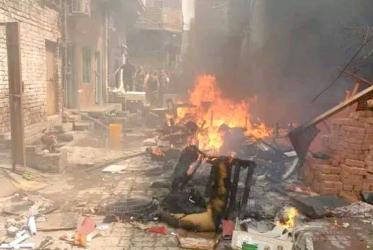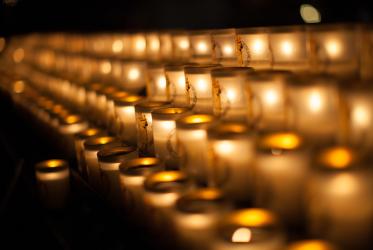Assessing the current situation, the participants agreed that the ongoing prevalence of violence and counter violence, which often involve Muslim and Christian communities, are mostly the product of unequal distribution of power and injustices in political, economical and social conditions, at both the global and the local levels. The unconstrained forces of globalisation, the widening economic and social gaps and inequalities, lack of real democracy within many countries and, in the context of international relations, double-standards on the part of world powers, the growing pressure on cultural identities due to the continuing process of globalisation, the failure of many countries to institutionalise the principle of equal citizenship in their political and social structures, the growing use by international powers of military means to achieve political goals, the denial of the legitimate rights of people under military occupation, such as the Palestinians striving for independence and self-determination, the unconditioned support by the United States of Israeli policies in the occupied Palestinian territories - these and other factors breed common frustration and despair, which in turn feed extremism, militancy and therefore violence.
The participants also observe that what is described as a "global war against terrorism" is often used by some local regimes as a pretext for further oppressive measures and policies. This, in turn, provokes more violence. The critique of terrorism, as an intensified form of indiscriminate violence, should not overlook state terror and violence.
Although violent conflicts are mainly caused by political, economic and social factors, for several various reasons they are often made to take a religious and sectarian character and articulated in religious terms. Among these reasons is the deliberate use of religion by certain powers to serve narrow self-interests and political end. This situation has been reinforced by the 'clash of civilisations' theory manipulated by global powers to disguise structural sources of conflict under a cultural and religious mask. In these global and local contexts religion may then become an intensifier of violent conflicts whose real causes are to be found outside religion. Due to the pressures created by the forces of globalisation, the shrinking role of the traditional national state in meeting the needs of its people is paralleled by the increase in its oppressive measures.
Both aspects help drive many people to fall back on their traditional structures and identities which may extend beyond their national borders. These factors reinforce a current tendency to globalise conflicts with an apparent religious character whereby conflicts in one place with its specific causes and character is conceived of as a global one dividing people along religious and cultural boundaries, so that it spills over into other regions with grave consequences.
In response to this current situation of growing violence, the participants, Christians and Muslims made the following common affirmations:
- Drawing on their common religious values and principles, Muslim and Christian participants affirm the sanctity of human life and dignity against any form of indiscriminate violence that threatens innocent people. This must include forms of state terror at both the local and international levels.
- Countering violence entails addressing, in concrete terms, its causes grounded in grave political, economic, social and cultural injustices. The participants assert their deep belief, rooted in their religious traditions, that justice is a universal value which should apply across the categories of religion, race, ethnicity, caste, gender and class. They therefore take a united common stand against all forms of oppression and injustice regardless of the religious identity of either the oppressor or the oppressed.
- The participants affirm the necessity for maintaining a clear distinction between oppressor and oppressed and between indiscriminate violence and the legitimate right of resistance to occupation.
- As conflicts and violence taking an apparently religious dimension often feed on misconceptions, misunderstanding and misrepresentation of the other, the participants affirm the continuous need for joint efforts by both Christians and Muslims to promote a culture of dialogue at the grass roots levels, and to foster mutual respect for difference, diversity and plurality as an inherent part of the human condition and manifestation of divine wisdom.
- The participants also affirm that the institutionalisation of the principle of equal citizenship and the promotion of civil society institutions represent major pre-conditions for equality and social peace.
- The participants also assert the urgent need for unified efforts by both Muslims and Christians to de-globalise conflicts, especially those given a religious character. Instead of globalising such conflicts and divisions, Muslims and Christians should work together to globalise the successful experiences of co-existence and shared living in certain parts of the world.
- As the situation in Palestine has proven to be a major source of conflict and violence, Muslim and Christian participants affirm the legitimate rights of the Palestinian people to self-determination and independence, and calls for the end of occupation which has caused so much suffering and grief.
In view of the above assessment and affirmations, the participants agree that one of the major priorities for common action is to work jointly in order to defend our respective religions against their abuse by political powers seeking to serve their political ends and narrow material gains, thus creating division along religious lines to mask their hegemony and exploitation as the major source of conflict and division. This should be done by drawing on our religious traditions and common values to address the real causes of conflict and to strive together for justice for all humanity of which we are but part.
This entails drawing on all our resources to offer guidance and education through available means including the media and the educational systems. In this context, it is important to encourage networking, co-ordination and collaboration, among organisations and institutions of similar concerns and interest. Inter-cultural exchange should be fostered to promote a global culture of diversity, pluralism and dialogue, grounded in our religions, to combat false interpretations that feed into exclusivism, militancy, extremism and violence.

